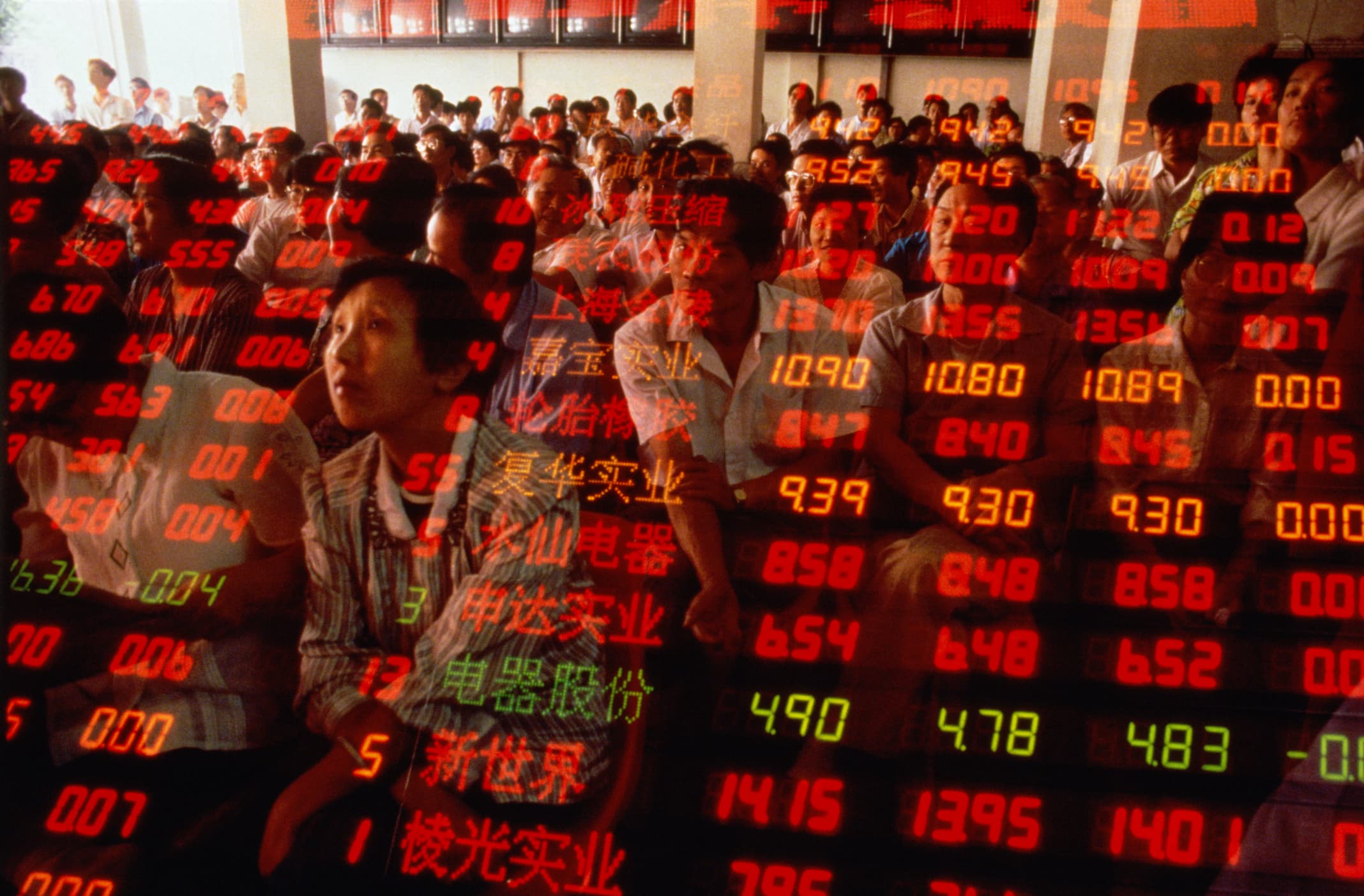Getty Images
Market dislocations triggered by the coronavirus crisis have sent more capital into Chinese stocks — and some strategists see this as part of a longer-term trend.
“We’re finding that a lot of foreign managers globally (are) reshuffling their holdings in this turmoil,” Todd Willits, head of flow tracking firm EPFR, said in a phone interview in late April. “Allocations to China are something people are looking to increase.”
As U.S. stocks plunged to three-year lows in March, allocation to Chinese stocks among more than 800 funds reached nearly a quarter of their nearly $2 trillion in assets under management, according to fund flow data from EPFR. That’s up from about 20% a year ago, and roughly 17% six years ago. The data covers funds that breaks down holdings into nine categories of stocks listed in mainland China, Hong Kong, Taiwan, the U.S. and Singapore.
Officially called Covid-19, the disease first emerged late last year in the Chinese city of Wuhan. It has since killed more than 4,600 people within the country, and over 292,000 overseas. In an effort to curb the global pandemic, local governments have locked down regions and limited business activity — that’s roiled financial markets as fears of a global recession gripped investors.
Although U.S. stocks have recovered significantly from their lows in April, mainland Chinese stocks have held up relatively well. The Shanghai composite is down 5.2% for the year so far, versus the S&P 500 which is down 11.1% year-to-date as of Tuesday’s close.
EPFR data showed dedicated China equity funds have seen outflows in recent weeks since many of the funds have sold in order to meet redemptions, or customer requests for cash. However, in an indication that the outflows are temporary, EPFR said funds invested across several regions are maintaining their allocations to China at the expense of other markets, as a way to meet overall investment return goals.
For investment funds that are focused on global emerging market stocks, the average allocation to China is 34%, while that for funds invested in Asian stocks excluding Japan, the China allocation is 38%.
Risks from US-China tensions
As trade tensions between the world’s two largest economies continue to drag on, political pressure has grown in the U.S. to limit American investment in Chinese companies.
In addition to that, the potential that investors’ funds go to fraudulent businesses beyond the jurisdiction of the U.S. government came to the forefront again last month. Nasdaq-listed Luckin Coffee disclosed fabrication of about 2.2 billion ($314 million) in sales, and shares of the Chinese coffee chain operator plunged more than 80% before they were suspended.
But investor interest in Chinese equities remains high, even in the U.S.
On Friday, May 8, Kingsoft Cloud became the first Chinese company to go public in the U.S. since the Luckin Coffee scandal and the coronavirus outbreak, which delayed some listings. Kingsoft Cloud shares have risen more than 40% in the three trading days since, and the cloud computing company has gained a valuation of $5 billion.
J.P. Morgan, UBS, Credit Suisse and CICC were underwriters for the offering, which was a spin-off from internet and software parent Kingsoft, which is listed in Hong Kong.
“We do see we have a very high quality order book, of the potential share subscription that comprises of high quality long only investors and reputable institutions across all the major countries,” Henry He, CFO of the cloud computing spin-off, said in a phone interview on Friday. Although the company was going public on the Nasdaq in New York, he was speaking from Hong Kong due to the travel restrictions from the coronavirus.
He expects gross revenue in the first quarter will likely be “no less” than that of the fourth quarter.
China is, even at lower levels of growth, going to be the dominant, the super majority driver of growth (over the) next 10 years.
Justin Leverenz
senior portfolio manager at Invesco
To limit risks from U.S.-China tensions on New York-listed Chinese stocks, Morgan Stanley strategists said in a May 6 report they prefer mainland Chinese A-shares to their U.S.-listed counterparts in their overall recommendation for investors to buy Chinese equities. A-shares are yuan-denominated shares of Chinese firms that are listed in mainland exchanges in Shanghai and Shenzhen.
Foreign investment in mainland Chinese stocks remains a tiny fraction of the entire market capitalization, partly due to restrictions on access. But A-shares are gradually becoming part of global investment portfolios, particularly after indexing company MSCI announced in 2018 that the mainland Chinese stocks would become part of its benchmark emerging markets index. Well over $1 trillion in assets track that MSCI stock index.
For Justin Leverenz, a team leader and senior portfolio manager for an emerging market equity team at Invesco in New York, the Chinese stock market represents the next new opportunity given local innovations in health care and technology, and the coronavirus’ relatively greater hit to other major economies.
“Every decade we have a significant bull market in something,” he said, pointing to previous rallies in U.S. technology and Japanese stocks. “China is, even at lower levels of growth, going to be the dominant, the super majority driver of growth (over the) next 10 years.”
— This article has been updated with the latest deaths according to data from Johns Hopkins University.
